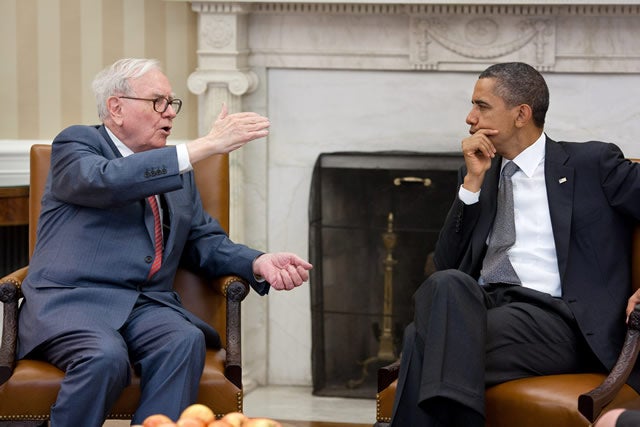The Truth about Billionaire Warren Buffett’s Tax Hike Pleas
Mike Brownfield /
Billionaire investor Warren Buffett has a special request for the U.S. government: He wants to be taxed more, he writes in today’s New York Times. The trouble is, he leaves out some very important facts—while feeding into President Barack Obama’s calls for higher taxes.
“Our leaders have asked for ‘shared sacrifice,'” he proclaims. “But when they did the asking, they spared me. I checked with my mega-rich friends to learn what pain they were expecting. They, too, were left untouched.”
“Shared sacrifice” is a well-worn catchphrase peppering President Obama’s remarks dating back to 2009, and it has become the the rhetorical centerpiece of his messaging throughout the debt ceiling debate. What does it mean? “Higher taxes”—so the President can continue his policies of higher spending, his favorite tool for trying to fix the economy.
Like a kid asking his parents for another spanking, billionaire Warren Buffett–a friend and donor to Obama–wants to be part of that shared sacrifice. And to make his point, he happily discloses intimate details of his tax bill (and compares it to those in his office, too.)
Last year my federal tax bill — the income tax I paid, as well as payroll taxes paid by me and on my behalf — was $6,938,744. That sounds like a lot of money. But what I paid was only 17.4 percent of my taxable income — and that’s actually a lower percentage than was paid by any of the other 20 people in our office. Their tax burdens ranged from 33 percent to 41 percent and averaged 36 percent.
“My friends and I have been coddled long enough by a billionaire-friendly Congress,” Buffett says. “It’s time for our government to get serious about shared sacrifice.” President Obama is happy to oblige, and he is already weaving Buffett’s supplication into his stump speech. “[Buffett] said we’ve got to stop coddling billionaires like me,” Obama remarked at a townhall in rural Minnesota today. “He pointed out that he pays a lower tax rate than anybody in his office, including the secretary.”
The trouble with this Obama–Buffett tax hike collusion, though, is all the pieces that are left out of the puzzle. First of all, the billionaire is paying more in taxes than he would lead you to believe. Dan Mitchell explains:
When Buffett receives dividends and capital gains, it is true that he pays “only” 15 percent of that money on his tax return. But dividends and capital gains are both forms of double taxation. So if he wants honest effective tax rate numbers, he needs to show the 35 percent corporate tax rate.
Moreover, as I noted in a previous post, Buffett completely ignores the impact of the death tax, which will result in the federal government seizing 45 percent of his assets. To be sure, Buffett may be engaging in clever tax planning, so it is hard to know the impact on his effective tax rate, but it will be significant.
Mitchell also points out that Buffett “completely ignores the impact of the death tax, which results in the federal government seizing 45 percent of his assets,” and “mischaracterizes the impact of the Social Security payroll tax, which is dedicated for a specific purpose.”
But apart from misstating his tax burden, Buffett fails to call for significant reforms in Social Security and Medicare that could reduce federal spending, and he downplays the role that taxation plays in investment decisions.
Buffett bizarrely downplays the role of taxation plays in investment decisions, arguing taxes have no impact on investing. We’ll take Buffett at his word that he doesn’t consider the tax implications for his investments (even though it is well documented in several books that he does consider them – one of the major tenets of the value investing practice Buffett follows is to hold equities as long as possible to minimize the impact of taxes and therefore maximize internal returns), but the rest of the investing world is solely concerned with after-tax returns to their investments. Tax rates including the capital gains rate, dividends rate, corporate income tax rate, and individual tax rate are major determinants of after-tax returns.
Then there’s the fact that a shortage of tax revenue isn’t even the root of Washington’s problem–too much spending is. While revenue will surpass its historical average of 18.0 percent of GDP once economic growth returns, spending is already 25 percent above its historical average and will remain there permanently if President Obama and his big government allies have their way.
A billionaire calling for more taxes might make great political theater, but there’s more to the story than Buffett—and Obama—would have you believe.

